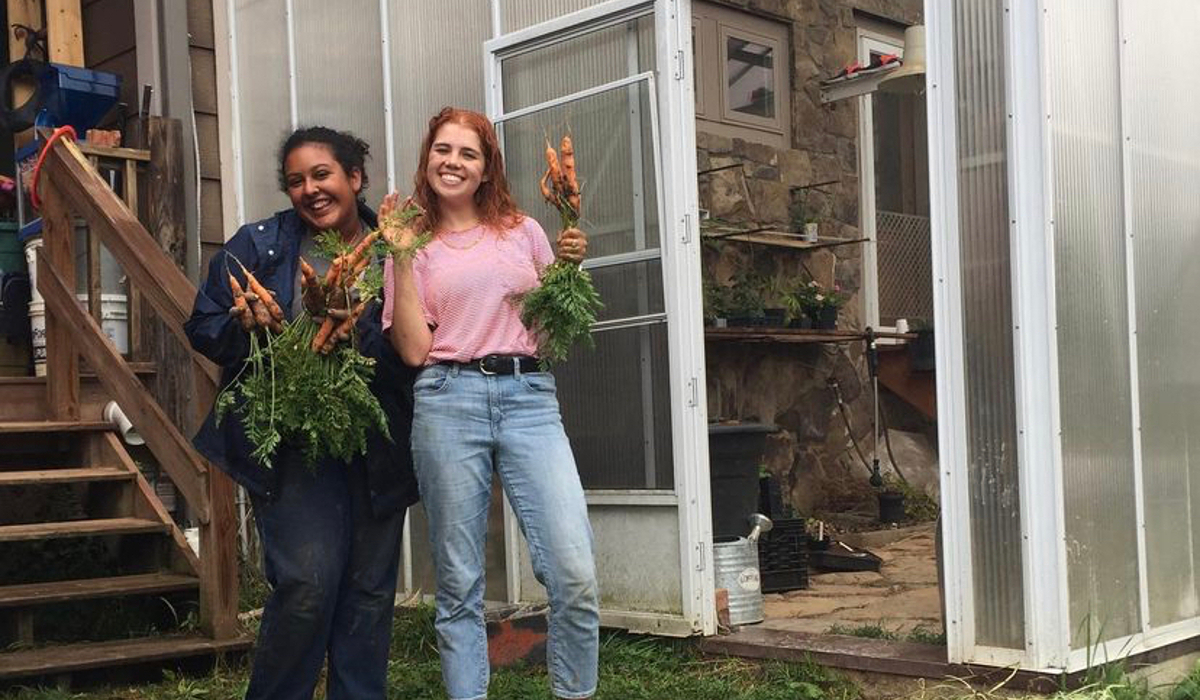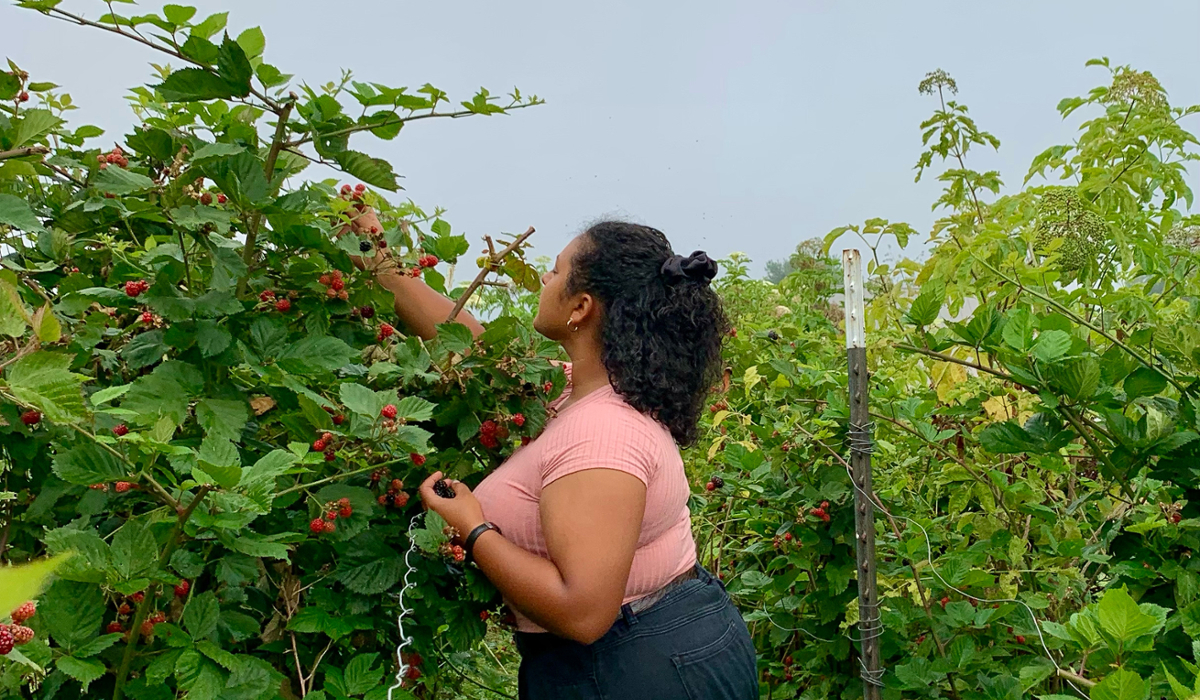

With a full return to campus this fall, students are finding joy in re-engaging in academic-year service opportunities. Did you know Campus Ministry sponsors service opportunities year round? Here, two students share their experiences with the Summer of Service program.
After a year spent mostly stuck inside, Junior Cindy Cintron spent the summer working with her hands to weed, harvest, and build at Bethlehem Farm in Alderson, W. Va., a Catholic community centered around service and sustainability. For more than eight weeks, Cintron served as the point person for the farm’s orchards. She helped take care of the community’s 50 chickens. And, with the help of a revolving team of volunteers, she would help local homeowners with much needed building repairs and construction projects.
“A lot of the community members couldn’t afford to pay normal construction companies to help them repair their homes, so they coordinated with us and we agreed to help them with their projects,” Cintron said. “We did the labor free of charge and then worked out a payment plan to cover supplies so that in the end, the only cost for the homeowners are those resources.”
Cintron’s experience working on the farm was supported by the Office of Campus Ministry’s Summer of Service stipend program. As part of the program, Catholic University students receive $2,500 grants to enable them to participate in long-term service projects (eight weeks or longer) of their choosing.
Harrison Hanvey is the University’s assistant campus minister for service and justice. He said the Summer of Service program was designed to give students the opportunity to spend an extended period of time working with marginalized populations, in order to develop deep relationships with those people facing challenges. Seven students participated in this summer’s inaugural program, with projects taking place all over the country, from New Jersey to Phoenix to the Mexican border in El Paso, Texas.
“So many of these students have a desire to make a difference and get involved in social change,” Hanvey said. “You can only learn so much in one week so this is an opportunity for them to dive into someone else’s reality for a longer period of time. What you normally hear from students who get really engaged in service is that when they form relationships with people experiencing homelessness, or who have a disability, or who are impacted by poverty, these encounters can create real transformation and impact the way they live and their worldview.”
Cintron said she decided to participate in the Summer of Service as a way of pushing herself out of her comfort zone. Prior to working on the farm, she had been involved with homeless food runs and tutoring programs for young people. She really enjoyed being able to meet and interact with the local community surrounding the farm in a deep way.
“It’s been a very special experience,” she said. “We were lucky enough to go to Mass at the local church and everyone was super sweet and welcoming. They knew me by my face and they knew my name.”
Doing such physical work and living in a community with so many other people could sometimes be exhausting, Cintron said. But in the end, she says she learned a lot about how to set boundaries to take better care of herself and others. She also gained a new perspective on her faith.
“Being there, you can really focus on caring for God’s creation,” she said. “When I was harvesting blueberries, I really felt like that was God’s gift to us for that day. It made me think differently about working to protect the environment. I want to practice sustainability and consider the impact of my simple food decisions.”




Senior Makinsey Jarboe, a biology major with a minor in psychology from Danbury, Conn., decided to participate in the Summer of Service program as a way to help others. She spent her summer living and working at L’Arche, a home for adults with intellectual disabilities in Arlington, Va. Though her mother is a special education teacher, Jarboe had never worked with adults with disabilities before.
“The first couple of weeks were a lot of training,” she said. “I was helping out around the kitchen and playing games and then later I was able to help with morning and nightly routines, physical therapy, and cooking for residents to support a healthy lifestyle.”
Working with adults with intellectual disabilities was an eye-opening experience, Jarboe said, giving her greater appreciation for the true dignity of every person.
“I was inspired by their mission statement where they really emphasize the need to make the gifts of all people known, both people with and without disabilities,” Jarboe said. “It’s not just about taking care of someone, but about living in solidarity with another as complete equals and building an environment where people are accepted exactly as they are.
“At first glance, you might not realize how much people can do because they’re not given the opportunities,” she said. “Once you get to know someone, you don’t see them for their disability. You see them as a human being with so many gifts.”
"You’re not meant to work on your faith alone.” — Makinsey Jarboe
While the acts of service were rewarding, Jarboe said she found more rewards from the meaningful friendships she formed with the L’Arche residents. Jarboe also enjoyed the way faith was incorporated into everyday actions, even chores, and how community members would gather to reflect on things they were grateful for and challenges they were having. This fall, Jarboe will continue to work at L’Arche in a part-time position.
“This has changed the way I think faith should be celebrated,” she said. “It’s meant to be something you grow into with other people. You’re not meant to work on your faith alone.”
Now that the summer is over, Hanvey has worked with students on a reentry program to help them reflect on their experiences and share their stories with others.
“I want them to think about what they are going to take away from these two months and how they can apply that to their lives going forward,” he said. “Two months in your life is just a blip, but what you learn from it can make a big difference.”
— Katie Bahr, Assistant Director of Media Relations and Communications.